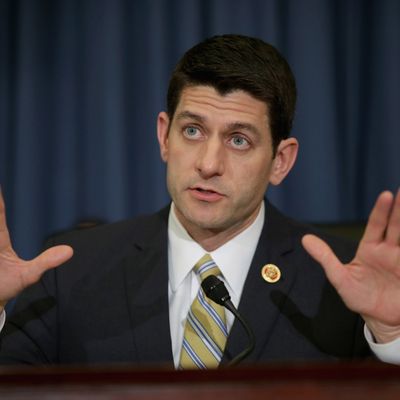
Paul Ryan has emerged from his long post-election period of repositioning, soul-searching, and secretly but not secretly visiting the poor. He had been caricatured as an Ayn Rand miser and attacked as a social Darwinist, merely for proposing the largest upward transfer of wealth in American history. Ryan has identified the root cause of his difficulties, and it is fiscal arithmetic.
The new Ryan, now fully formed, emerges in an interview with Philip Klein that is revealing precisely for its evasiveness. The overview of Ryan’s new strategy must be pieced together from several elements.
1. Tax cuts for all! Ryan has found himself caught between his career-long obsession with cutting taxes for the rich and the problem of what happens to the revenue that would be lost. During the 2012 campaign, he swept aside the problem by couching his plan as “tax reform,” promising not to cut taxes for the rich. Ryan’s new plan is just to go ahead and cut taxes.
He tells Klein, “Those of us who live in the tax system want to lower everybody’s tax rates.” If you lower everybody’s tax rates, then everybody will be paying less in taxes, and then the government will have less revenue, right? That’s where Ryan’s solution comes in: He plans to press the government budget agencies to adopt the optimistic assumption he prefers, which is that cutting tax rates for the rich creates faster economic growth. Ryan spent much of the Bush years assailing what he called “static scoring,” which is the standard budget practice of measuring the fiscal impact of tax cuts as if they do not contain magic pixie dust.
As Danny Vinick has noticed, Ryan has announced his intention to change the rules. Ryan reaffirmed that plan in his interview with Klein: “I’d like to improve our scorekeeping so it better reflects reality,” he said. “Reality” is Ryan’s description for a world in which Bill Clinton’s punishing tax hikes on the rich hindered the economy, which was restored to health when George W. Bush cut taxes.
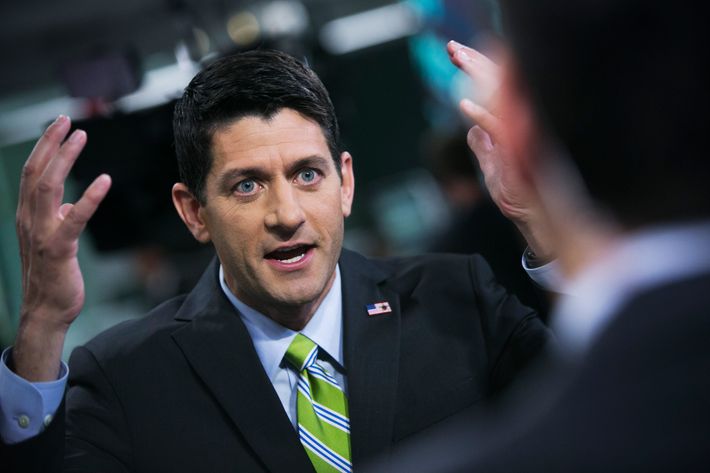
2. I have a budget, sort of. Klein begins the interview by asking Ryan if he agrees with the criticism that Republicans are coasting into the election on the basis of Democratic votes dropping off during midterms and a favorable map, rather than laying out their policy alternative. Ryan states emphatically that he agrees. He then executes this subtle pivot: “I, for one, think you need to run on something, that’s why I wrote and passed four budgets in a row.”
Now, keep in mind, Ryan does not believe he can be held accountable for those budgets. When asked last spring to defend his budget, which imposes massive cuts in funding for programs that benefit the poor, he replied, “I can’t speak for everybody and put my stuff in their budget. My work on poverty is a separate thing.”
Note the difference in tone. When asked about his willingness to stand behind specific proposals, Ryan cites the budget “I wrote.” When asked to defend what’s in it, he calls it “their budget.” The budget exists only as a symbol of Ryan’s virtue, not as a collection of discrete policies he has to defend.
3. That Obamacare replacement plan will never happen. Republicans have debated whether it is actually still possible to repeal Obamacare, or if they should instead try to shape it into a more conservative-friendly law. Ryan tells Klein that they need to repeal it and “start over,” and promises to “go back to the pre-Obamacare baseline,” rather than assume that the millions of Americans who have gained coverage through the law can keep it.
That sounds dangerous and potentially unpopular, though. So Ryan also promises to give them some unspecified alternative. “A smart system that is patient-centered will give everybody the ability to get affordable insurance,” he promises. If this smart, patient-centered plan can give everybody affordable insurance, why haven’t Republicans voted on it already?
If your answer to that question is “because that plan to give everybody affordable insurance without harming anybody does not and cannot exist,” then your suspicions will be confirmed by Ryan’s explanation. The Republicans’ approach has always been to float numerous “alternatives,” containing various popular-sounding elements, none of which has to add up to a coherent plan, and none of which binds Republicans to a defined Party-wide alternative.
Klein asks Ryan about Bobby Jindal’s proposal that “Republicans should hold a vote on an alternative.” (Easy for Jindal to say — he isn’t in Congress and wouldn’t have to vote.) Ryan replies, “Yeah, I think we should put alternatives out there for sure.” Everything about Ryan’s reply is designed to make it sound like he agrees with Jindal’s proposal. But he wriggles away from the core promise by changing “an alternative” to “alternatives.”
Ryan also explains that the ethereal Republican plan will make affordable insurance available to one and all, but warns, “That’s not something you can necessarily capture in scoring.” That is to say, the budget forecasters will not, per se, “measure” the “impact” of Ryan’s “plan” in a way that matches his rhetoric. As with tax cuts, Ryan’s strategy revolves around ignoring budget forecasters or forcing them to adopt his alternative ideological approach.
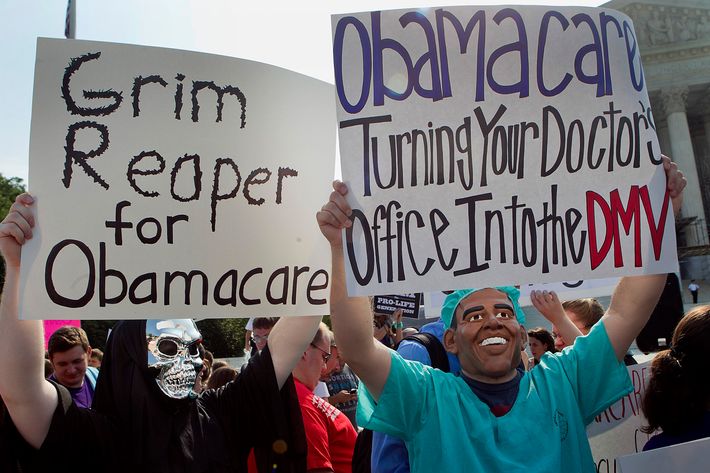
4. Obamacare is hurting Americans by cutting prices. When asked about the fact that health care inflation has actually fallen (to its lowest level in 50 years, in fact), Ryan first asserts that insurance premiums will rise — “we’re gonna see another round of price increases this October.” (In fact, premiums for next year are set to rise at a lower rate than pre-Obamacare premium increases.)
Ryan goes on to assail the way the law has held down spending, and here he has a point. The Obamacare exchanges have produced lower-than-expected premiums because they have used narrow networks of doctors and hospitals. This can be inconvenient. Ryan says he is outraged, telling Klein, “I don’t think this is the kind of country that is going to stand for being told who and where they’re going to get their health care.”
Except that very dynamic is exactly the way Ryan’s own fabled Medicare plan is designed to work — by having insurance companies lure customers by competing to hold down prices, in part by excluding doctors and hospitals that charge too much. Only now, rather than hold up this scheme of exchanges with private insurers as the silver bullet to solve America’s problems, Ryan is exploiting discontent with it. He is implicitly promising that people will be able to go to whichever doctor or hospital they want, regardless of price. Of course he won’t say how he’ll pay for that luxury, either. Put it on the tab.
Which of course brings us to:
5. The debt crisis is still real, man. Ryan has been warning for four years of an imminent debt crisis and skyrocketing interest rates. Nothing like this has happened. But Ryan speaks as though his warnings have proven true rather than laughably wrong:
The shame of it is, we just wasted eight years of knowing this crisis was coming, it’s the most predictable economic crisis we’ve ever had in this country, knowing about it, and not doing anything about it for eight years because of this presidency.
So Ryan assails Obama for doing nothing about the long-term deficit, which he calls a “crisis” and claimed would lead to interest rate hikes years ago that are still nowhere in sight. It is true that long-term deficits are projected to rise somewhat. It is not true that Obama has done nothing. He let the Bush tax cuts on income over $450,000 rise, over Ryan’s fierce objections. He also passed a health-care reform that the Congressional Budget Office projected would cut a trillion dollars from the deficit in its second decade, and which is so far producing lower costs in the federal health-care budget than even its most optimistic advocates predicted. Here is the projected future federal budget deficit as of 2009:
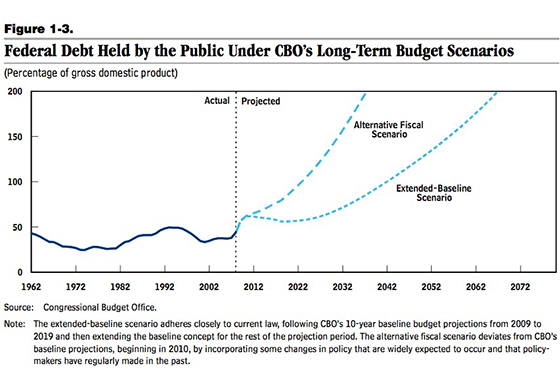
And here is the projected deficit as of 2014:
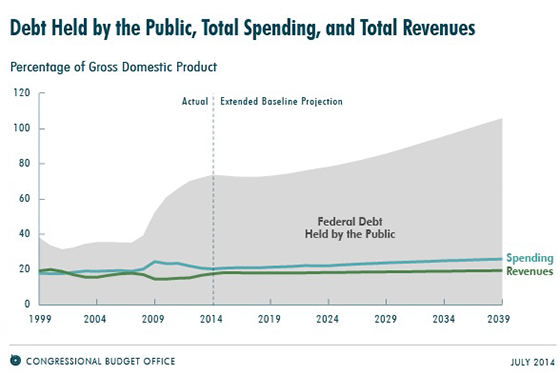
Note that under the likely scenario represented by the steeper line, with the Bush tax cuts continuing in their entirety, the national debt was projected to hit 200 percent of gross domestic product by 2032. It is now projected to be at less than half that level.
So, let us review. Obama enacted policies to increase revenue and slow health-care inflation, over the staunch and often hysterical opposition of Ryan, who insisted that budget forecasts showing that Obama’s proposals would reduce the deficit were wrong. The deficit has in fact fallen very fast. Ryan’s response is to deny that any of this has happened, to castigate Obama for failing to reduce the deficit, and to propose new measures that would increase it. And he wants everybody to ignore the budget forecasters because their numbers won’t bear out his claims.






























